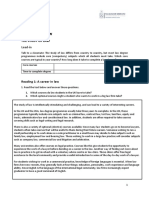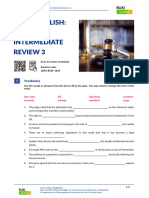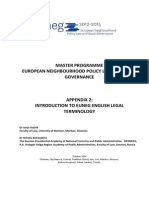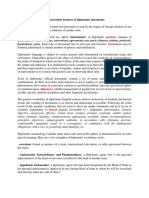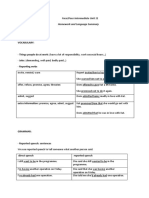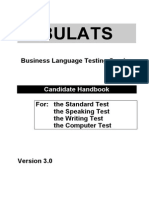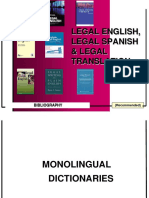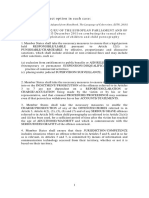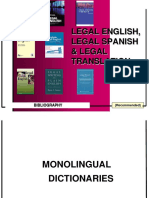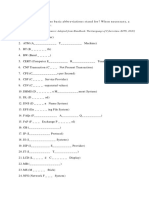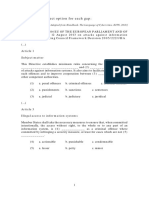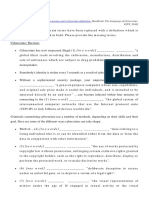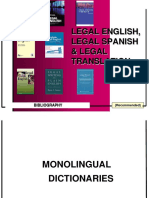LANGUAGE EXERCISES
1
� Some of the exercises have been adapted from the following handbooks, published by ERA:
(1) Legal English for Judicial Cooperation in Civil Matters. Regulation 2201/2003 on Matrimonial
Matters and Parental Responsibility (Brussels IIa). 2016. ISBN: 9783981823516
(2) Legal English for Judicial Cooperation in Civil Matters. Regulation 1215/2012 on jurisdiction and
the recognition and enforcement of judgments (Brussels Ia). 2016. ISBN: 9783981823509
Some of the exercises have been adapted from the following handbooks, published by EJTN:
(1) English for Judicial Cooperation in Criminal Matters. Handbook. 2012/2015. ISBN:
9789081999045
(2) Handbook. English for Judicial Cooperation in Civil Matters. 2012/2015. ISBN: 9789081999069
2
� A. Prepositions in sentences
1. The parties must abide by the terms of the agreement.
2. Third parties are not eligible for that kind of compensation.
3. The costs of litigation have been accounted for when calculating the final amount.
4. I think we can rule out any compensation at this stage of the proceedings.
5. Counsel is subject to the requirements of the Civil Procedural Code.
6. The witness was served with the summons.
7. Pursuant to the contract, the amount will be transferred next month.
8. The company must set down very clear guidelines to deal with complaints.
9. The defendant submitted an application to the Court.
10. I think his company will benefit from the contract.
11. The lawyer’s argument rested on an incorrect assumption.
12 No rights are assigned to a third party under this contract.
13. The company agreed to the terms subject to certain conditions.
14. The claimant filed an application for an injunction.
15. The defendant was charged with murder.
16. Should there be a breach, we can always enforce the contract against the seller.
17. The legal team consists of three civil and two criminal lawyers.
18. No rights are conferred to third parties under this contract.
19. The parties finally entered into the agreement after a long negotiation.
20. There is no third-party beneficiary to this contract.
21. Both parties are entitled to damages should there be breach of contract by either
one.
22. The contract provides for compensation under special circumstances.
23. We objected to further amendments being made to the draft contract.
3
� B. Prepositions within a text
Complete the text below using the correct preposition.
Decision OF the Court
Article 6 §§ 1 and 3 (c) (right TO a fair hearing and right TO be assisted by counsel)
As the Court had stated ON many occasions, the purpose of the Convention was TO
protect rights that were not theoretical or illusory but practical and effective, and the
appointment of counsel did not IN itself ensure the effectiveness OF defence rights. The
State sometimes had to act where problems of representation before the courts were
drawn TO its attention. However, Article 6 § 3 (c) obliged authorities TO intervene only
where the default OF an assigned lawyer was manifest. IN such cases, when put ON
notice, the competent authorities had to replace the defaulting lawyer or oblige him to
perform his mission, WITHOUT which the notion of free legal assistance would be
meaningless.
Where a lawyer, especially one who had been officially assigned, decided not to act IN a
case or was prevented FROM appearing at a hearing, he or she had a duty TO inform the
assigning authority OF the situation and to do all that was necessary as a matter of urgency
to preserve his or her client’s rights and interests. Mr Vamvakas’ lawyer, appointed ON 2
January 2010 FOR the hearing of 5 February 2010, did not seem AT any time to have
explained that he was unable to pursue his mission. It was unlikely that, as he had said, he
had contacted the registry OF the Court of Cassation to request the adjournment OF the
hearing, because he would certainly have been informed that a telephone call was not a
proper means OF notification FOR that purpose UNDER domestic law – it was necessary
FOR a written request to be sent or FOR a fellow lawyer to appear ON the day of the
hearing to ask FOR an adjournment.
Since it was impossible UNDER Greek law to reverse a decision to find an appeal ON
points of law inadmissible, it had been FOR the Court of Cassation to enquire ABOUT
the reasons FOR the nonappearance of Mr Vamvakas’ lawyer. The Court of Cassation
had indeed been confronted WITH a situation of “manifest default” – the unexplained
absence of the lawyer Mr F.K. FROM the hearing held one month and three days AFTER
his appointment, WITHOUT any request for adjournment having been received FROM
him – requiring the court to adjourn its proceedings in order TO clarify the situation rather
than dismiss the appeal ON points of law as not maintained.
Consequently, as the Court of Cassation had failed to ensure practical and effective respect
FOR Mr Vamvakas’ defence rights, the Court found that there had been a violation of
Article 6 §§ 1 and 3 (c).
4
� C. Prefixes
Add the prefixes dis-, im-, in-, ir-, il-, ab- or un- to each of these words to form their
opposites (antonyms).
1. Agree disagree 2. Licit illicit
3. Dependent independent 4. Valid invalid
5. Respective irrespective 6. Practicable impracticable
7. Legal illegal 8. Fair unfair
9. Normal abnormal 10. Written unwritten
11. Limited unlimited 12. Justice injustice
13. Restricted unrestricted 14. Direct indirect
15. Formal informal 16. Comparable incomparable
17. Lawful unlawful 18. Constitutional unconstitutional
19. Likely unlikely 20. Reconcilable irreconcilable;
21. Competent incompetent 22. Sufficiently insufficiently
23. Reliability unreliability 24. Authorised Unauthorised
5
� D. The passive voice (Level I)
Turn the following sentences into passive structures.
(Source: Council Regulation (EC) No 1206/2001 of 28 May 2001 on cooperation between the
courts of the Member States in the taking of evidence in civil or commercial matters)
1. We should improve cooperation between courts in the taking of evidence.
Cooperation between courts in the taking of evidence should be improved
2. Member States cannot sufficiently achieve the objectives of the proposed action.
The objectives of the proposed action cannot be sufficiently achieved by Member States
3. The Community may adopt measures in accordance with the principle of subsidiarity.
Measures may be adopted by the Community in accordance with the principle of
subsidiarity.
4. We should execute a request for the performance of the taking of evidence
expeditiously.
A request for the performance of the taking of evidence should be executed
expeditiously.
5. The requested court should execute the request in accordance with the law of its
Member State.
The request should be executed by the requested court in accordance with the law of
its Member State.
6
� E. The passive voice (Level II)
Turn the following sentences into passive structures.
1. In order to obtain a fair trial, the defendant needs to have access to the court.
Access to the court by the defendant is needed in order to obtain a fair trial.
2. The ECHR has upheld many claims of immunity on the basis that there is a public interest
consideration.
Many claims of immunity have been upheld on the basis that there is a public interest
consideration.
3. Nobody can sue an MP for defamation.
An MP cannot be sued for defamation.
4. Would the judge have imposed the right sentence in that case?
Would the right sentence have been imposed by the judge in that case?
5. Juries believe that some offenders are more dangerous than others.
Some offenders are believed to be more dangerous than others.
It is believed that some offenders are more dangerous than others.
6. In certain circumstances it is possible to try a criminal defendant in his absence.
A criminal defendant can be tried in his absence in certain circumstances.
7. Did the defendant tell her solicitor before the hearing?
Was the defendant´s solicitor told before the hearing?
8. The parties must fill in the appropriate forms.
The appropriate forms must be filled in by the parties.
9. The prosecutor had not noticed me in the courtroom.
I had not been noticed by the prosecutor.
10. Counsel found the case to be hopeless.
The case was found to be hopeless by counsel.
7
� F. Word combinations (collocations). Criminal matters
Fill in the blanks with the appropriate adjective in the following word combinations:
[Source: adapted from “Language training on the vocabulary of judicial cooperation in criminal matters”. EJTN,
2015]
1. An order to freeze something is a freezing order.
2. An order to confiscate something is a confiscation order.
3. The reasons on the basis of which a country may refuse to recognise a judgment
are called the grounds for refusal.
4. When assistance is denied by a country, it refuses assistance.
5. When documents are delivered to someone, it is called the service of documents.
6. Crime that goes across country borders is called cross-border crime.
7. When someone’s body is examined, it is called a bodily examination.
8. A criminal investigation which is underway is a(n) ongoing criminal investigation.
9. A sentence to be spent in custody is a custodial sentence.
10. The approximate place where a person is thought to be is called the whereabouts
of a person.
8
� G. Compound adverbial-prepositional phrases
Use compound adverbial-prepositional phrases to fill in the gaps, using the explanation given
in brackets.
whereat, hereafter, hereinafter, thereupon, whereof, thereafter, heretofore, thereof, whereabouts, hereinabove, therein,
herewith, hereunder, wherefore, thereby, herein, hereto, whereby, thereto, hereby, whereupon
1. The questions raised in point 27 hereinabove have to be taken into consideration.
(PREVIOUSLY IN THIS DOCUMENT)
2. All procedural documents, as well as any other correspondence sent to the Board, must be lodged
at the Registry of the Board (hereinafter "the Registry").
(LATER REFERRED TO IN THIS DOCUMENT)
3. Accordingly, by the present Communication the Commission formally informs the Council of its
intention to adopt the measures presented in the Annex hereto.
(TO THIS DOCUMENT, OR MATTER, OR PLACE)
4. The practice of holding national seminars open to all actors has heretofore been seen only as part
of the process of putting together national plans.
(BEFORE NOW, SO FAR, UP TO NOW)
5. Where a national accreditation body does not meet the requirements of this Regulation or fails to
fulfil its obligations hereunder, the Member State concerned shall take appropriate corrective action.
(LATER REFERRED TO IN THIS DOCUMENT)
6. The six remaining approved evaluation reports are presented herewith.
(WITH THIS DOCUMENT; ATTACHED)
7. The seller tried to charge extra interest, whereat the buyer objected.
(AT WHICH)
8. This article also contains the process whrereby inspections supervised by the Commission are put
in place to check the effectiveness of these measures.
(BY WHICH)
9. The current tobacco premium system will no longer exist as from 1 January 2006, wherefore it is
necessary to establish, as a transitional measure, a new basis for calculating the future quota buy-back
price.
(AS A RESULT OF WHICH)
10. In witness whereof the undersigned, being duly authorised thereto, have signed this Protocol.
(OF WHAT/OF WHICH)
11. Private citizens may hand in unlicensed firearms to police authorities, whereupon possible charges
for illegal possession may be dropped.
(IMMEDIATELY AFTER WHICH)
9
�12. The number of district courts is hereafter reduced from 82 small local courts to 24 larger district
courts.
(FROM NOW ON)
13. The parties hereby agree that, in the event of dispute, jurisdiction shall remain with the courts of
Portugal.
(BY THIS MEANS, BY THIS DOCUMENT)
14. All other products mentioned herein may be trademarks of their respective companies.
(IN THIS DOCUMENT, MENTIONED HERE)
15. This lease will be valid from one year from this date and will be renewed yearly thereafter.
(AFTER THAT TIME, IN THE FUTURE)
16. Corruption was found to scare away investment, thereby lowering economic growth.
(AS A RESULT OF THAT)
17. Copies or reproductions to be discarded shall be destroyed to avoid access to the information
contained therein or its later recovery.
(IN THAT PLACE OR DOCUMENT)
18. Please provide statistical data on the number of complaints received and investigated in this
respect during the reporting period, as well as the number of prosecutions and convictions thereof.
(OF WHAT HAS BEEN MENTIONED JUST NOW)
19. Legislative guides for the implementation of the United Nations Convention against transnational
organized crime and the protocol thereto must be followed.
(ATTACHED TO IT/TO THAT DOCUMENT)
20. (…) it is thereupon ordered and adjudged that payment be made to the claimant.
(DIRECTLY FOLLOWING THAT; CONCERNING THAT MATTER)
21. There is information about the whereabouts of those fugitives, but there is still little progress in
arresting them.
(PLACE WHERE SOMEONE OR SOMETHING IS)
10
� H. Subjunctive
Put in the appropriate subjunctive in the gaps. After that, build the sentence again
using a more colloquial structure without a subjunctive.
1. The judge instructed that exhibits two & three be made available (EXHIBITS TWO
& THREE, MAKE AVAILABLE) to the jury.
The judge instructed that exhibits two & three should be/were made availbable.
2. His Honour Judge Smith recommended that answers be kept (ANSWERS, KEEP)
short and simple when giving evidence.
His Honour Judge Smith recommended that answers should be kept/were kept )
short and simple when giving evidence.
3. It was requested that the defendant be (THE DEFENDANT, BE) present in the
hearing.
It was requested that the defendant should be/was present in the hearing.
4. The Court of Justice of the European Union ordered that all the proceedings be
joined (ALL THE PROCEEDINGS, JOIN).
The Court of Justice of the European Union ordered that all proceedings should
be joined/ were joined.
5. It is essential that witnesses be (BE) available in the premises of the court at all
times.
It is essential that witnesses were available in the premises of the court at all times.
11
� I. Word building (within excerpts)
Fill in the blanks using the right form of the prompt given.
[Source: adapted from “Language training on the vocabulary of judicial cooperation in criminal matters”. EJTN,
2015]
1) There is room for further action (act) on the part of the European Union to ensure full
impletation (implement) and respect of the Convention standards.
2) The procedural (procedure) rights of suspected or accused persons are particularly
important in order to safeguard the right to a fair trial (try).
3) Whilst various measures have been taken at European Union level to guarantee a high
level of safety (safe) for citizens, there is an equal need to address specific problems that
can arise when a person is suspected or accused in criminal proceedings. This calls for
specific action on procedural rights, in order to ensure the fairness (fair) of the criminal
proceedings.
4) The 2004 Hague Programme states that further realization of mutual recognition
(recognize) as the cornerstone of judicial cooperation implies the development (develop)
of equivalent standards of procedural rights in criminal proceedings.
5) A lot of progress has been made in the area of judicial and police cooperation on
measures that facilitate prosecution (prosecute). It is now time to take action to improve
the balance between these measures and the protection (protect) of procedural rights of
the individual.
6) Any new EU legislative (legislate) acts in this field should be consistent with the
minimum standards set out by the Convention, as interpreted by the European Court
of Human Rights.
7) A suspected or accused person should receive information (inform) about the nature
and cause of the accusation (accuse) against him or her. A person who has been charged
should be entitled, at the appropriate time, to the information necessary for the
preparation (prepare) of his or her defence(defend).
8) A suspected or accused person who is deprived of his or her liberty shall be promptly
informed of the right to have at least one person, such as a relative or employer,
informed of the deprivation (deprive) of liberty.
9) The Member States of the EU are all signatories (sign) of the principal treaty setting
these standards, the European Convention on Human Rights.
10) The Green Paper on procedural rights is the outcome of a lengthy consultation
process, both with interested parties and with government representatives (represent).
12
� J. Inversion
Do the correct inversion, using the sentences given.
[Source: adapted from “Language training on the vocabulary of judicial cooperation in criminal matters”. EJTN, 2015]
1. He is hardly aware of his constitutional rights.
Hardly is he aware of his rights.
2. The arresting officer must on no account violate the suspect’s rights.
On no account must the arresting officer violate the suspect’s rights.
3. The State has rarely provided legal aid in these circumstances.
Rarely has the state provided legal aid.
4. There has seldom been so much protest against a Commission proposal.
Seldom has there been so much protest against a Commission proposal
5. Some Member States will never support the creation of a European Public Prosecutor.
Never will some Member States support the creation of a European Public Prosecutor.
13
� K. Conditionals
Rewrite the following sentences so that they no longer contain the word “if”.
1. If you should file for divorce, do it in England.
Should you file for divorce, do it in England.
2. If you were to choose the court, where would you choose to have your case heard?
Were you to choose the court, where would you choose to have your case heard?
3. If she had filed in England, her conduct would have been irrelevant.
Had she filed in England, her conduct would have been irrelevant.
4. The English media would not be against the Rome III plan if it were to work.
Were it to work, the English media would not be against the Rome III plan.
5. Mrs. Vaughan wouldn’t have claimed the £215,000 if her husband’s maintenance
payments had not been cancelled.
Had her husband’s maintenance payments not been cancelled, Mrs. Vaughan wouldn’t
have claimed the £215,000.
14






